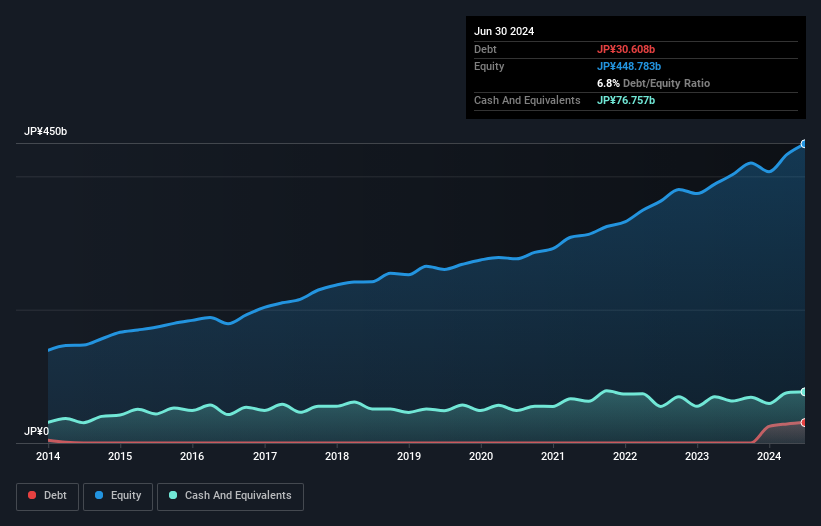The external fund manager backed by Berkshire Hathaway's Charlie Munger, Li Lu, makes no bones about it when he says 'The biggest investment risk is not the volatility of prices, but whether you will suffer a permanent loss of capital.' So it might be obvious that you need to consider debt, when you think about how risky any given stock is, because too much debt can sink a company. We note that Sysmex Corporation (TSE:6869) does have debt on its balance sheet. But is this debt a concern to shareholders?
When Is Debt Dangerous?
Generally speaking, debt only becomes a real problem when a company can't easily pay it off, either by raising capital or with its own cash flow. In the worst case scenario, a company can go bankrupt if it cannot pay its creditors. However, a more common (but still painful) scenario is that it has to raise new equity capital at a low price, thus permanently diluting shareholders. Of course, plenty of companies use debt to fund growth, without any negative consequences. The first thing to do when considering how much debt a business uses is to look at its cash and debt together.
Check out our latest analysis for Sysmex
How Much Debt Does Sysmex Carry?
You can click the graphic below for the historical numbers, but it shows that as of June 2024 Sysmex had JP¥30.6b of debt, an increase on none, over one year. However, it does have JP¥76.8b in cash offsetting this, leading to net cash of JP¥46.1b.

How Healthy Is Sysmex's Balance Sheet?
We can see from the most recent balance sheet that Sysmex had liabilities of JP¥105.8b falling due within a year, and liabilities of JP¥71.6b due beyond that. Offsetting this, it had JP¥76.8b in cash and JP¥147.7b in receivables that were due within 12 months. So it actually has JP¥47.0b more liquid assets than total liabilities.
This short term liquidity is a sign that Sysmex could probably pay off its debt with ease, as its balance sheet is far from stretched. Succinctly put, Sysmex boasts net cash, so it's fair to say it does not have a heavy debt load!
The good news is that Sysmex has increased its EBIT by 7.6% over twelve months, which should ease any concerns about debt repayment. When analysing debt levels, the balance sheet is the obvious place to start. But ultimately the future profitability of the business will decide if Sysmex can strengthen its balance sheet over time. So if you're focused on the future you can check out this free report showing analyst profit forecasts.
Finally, a business needs free cash flow to pay off debt; accounting profits just don't cut it. While Sysmex has net cash on its balance sheet, it's still worth taking a look at its ability to convert earnings before interest and tax (EBIT) to free cash flow, to help us understand how quickly it is building (or eroding) that cash balance. Looking at the most recent three years, Sysmex recorded free cash flow of 30% of its EBIT, which is weaker than we'd expect. That weak cash conversion makes it more difficult to handle indebtedness.
Summing Up
While we empathize with investors who find debt concerning, you should keep in mind that Sysmex has net cash of JP¥46.1b, as well as more liquid assets than liabilities. On top of that, it increased its EBIT by 7.6% in the last twelve months. So we don't have any problem with Sysmex's use of debt. Over time, share prices tend to follow earnings per share, so if you're interested in Sysmex, you may well want to click here to check an interactive graph of its earnings per share history.
At the end of the day, it's often better to focus on companies that are free from net debt. You can access our special list of such companies (all with a track record of profit growth). It's free.
New: Manage All Your Stock Portfolios in One Place
We've created the ultimate portfolio companion for stock investors, and it's free.
• Connect an unlimited number of Portfolios and see your total in one currency
• Be alerted to new Warning Signs or Risks via email or mobile
• Track the Fair Value of your stocks
Have feedback on this article? Concerned about the content? Get in touch with us directly. Alternatively, email editorial-team (at) simplywallst.com.
This article by Simply Wall St is general in nature. We provide commentary based on historical data and analyst forecasts only using an unbiased methodology and our articles are not intended to be financial advice. It does not constitute a recommendation to buy or sell any stock, and does not take account of your objectives, or your financial situation. We aim to bring you long-term focused analysis driven by fundamental data. Note that our analysis may not factor in the latest price-sensitive company announcements or qualitative material. Simply Wall St has no position in any stocks mentioned.
About TSE:6869
Sysmex
Engages in the development, manufacture, and sale of diagnostic instruments, reagents, and related software.
Excellent balance sheet established dividend payer.
Similar Companies
Market Insights
Community Narratives



